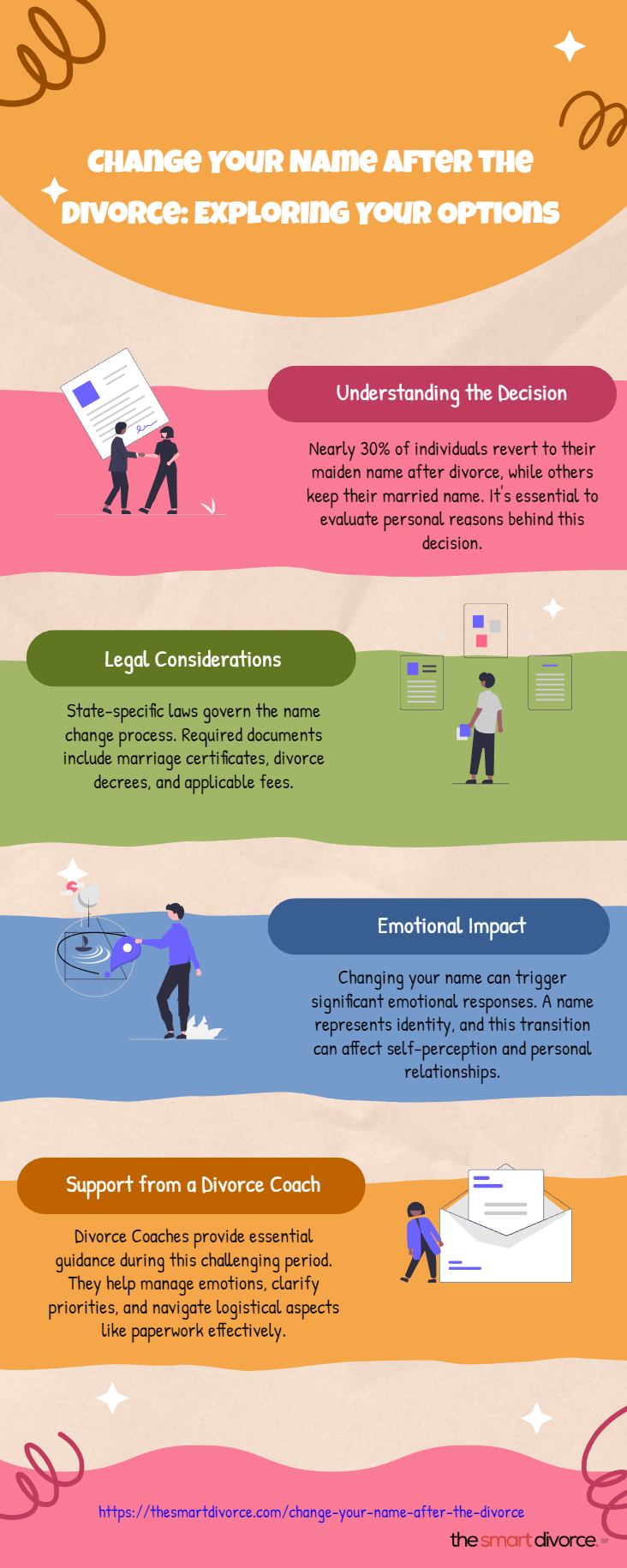Divorce can bring about many changes, and deciding whether or not to change your name after a divorce is a personal decision that can significantly impact your future. This guide will help you understand your options, the legal implications, and how a Divorce Coach can assist you in making the best decision for your circumstances.
Understanding Your Options: To Change or Not to Change?
When going through a divorce, you might wonder, “Should I change my name back to my maiden name, or should I keep my married name?” Here are the main options you have:
- Keep Your Married Name: Many choose to keep their married name, especially if they have children, a professional identity associated with it, or simply because it has become a part of their personal identity over time.
- Revert to Your Maiden Name: Others opt to return to their maiden name, feeling that this change signifies a fresh start or a return to their roots and independence.
- Choose a Completely New Name: While less common, some choose a completely new name, which can symbolize a significant change or new chapter in life.
The Legal Process of Changing Your Name
The Name Change Process after a divorce is a straightforward legal process, but it does require attention to detail:
- Include the Name Change in Your Divorce Decree: If you decide to change your name, it is beneficial to include this request in your divorce decree. This will simplify the process and reduce additional legal steps afterward.
- File a Petition: If the documentation for your name change isn’t included in your divorce decree, you must petition your local court. This involves submitting name alteration papers, paying a fee, and possibly attending a court hearing.
- Notify the Necessary Authorities: Once your official documentation is recognized, you’ll need to update your name with various institutions, including:
- Social Insurance Administration
- Department of Transportation (DOT)
- Passport Office
- Financial institutions, such as banks and credit card companies
- Utility companies, subscription services, and other personal accounts
Emotional and Practical Considerations
Deciding on a Legal Name Change after a divorce isn’t just a legal matter—it involves emotional and practical considerations:
- Personal Identity: For many, a name is a significant part of their identity. Reflect on what your name means to you and how it affects your sense of self.
- Professional Implications: If your married name is associated with your professional identity, consider how a name change might impact your career. Will clients, colleagues, or professional networks be confused by a change?
- Family Ties: If you have children, maintaining the same last name as your children might be necessary for consistency and unity.
- Emotional Closure: For some, changing their name can achieve emotional closure and symbolize a new beginning.
How a Divorce Coach Can Assist You
Navigating a name change’s emotional and logistical aspects during a divorce can be challenging. A Divorce Coach can provide invaluable Support by:
- Offering Objective Advice: A Divorce Coach can help you weigh the pros and cons of changing your name, considering both emotional and practical aspects.
- Providing Emotional Support: Understanding your emotions during this time is crucial. A Divorce Coach offers empathetic Support to help you through the decision-making process.
- Guiding Through the Legal Process: While a Divorce Coach isn’t a lawyer, they can help you understand the name change process and ensure you’re prepared for each stage.
- Helping with the Transition: A Divorce Coach can provide guidance and resources to ease the transition from notifying institutions of your name change to updating your documents.
Pros and Cons of Changing Your Name After Divorce
To help you make an informed decision, here are some pros and cons to consider:
Pros:
- Symbolizes a Fresh Start: Changing your name can signify a new chapter and help with emotional closure.
- Reclaiming Personal Identity: Returning to your maiden name or choosing a new one can help reclaim your identity.
- Practical Benefits: It can simplify personal documentation, especially if you want to remove any associations with your ex-spouse.
Cons:
- Emotional Impact on Children: If you have children, changing your name might create a sense of disconnection or confusion.
- Professional Complications: Altering your professional identity can lead to challenges, such as confusion among clients or colleagues.
- Time-Consuming Process: The legal process, while straightforward, can be time-consuming and involve various administrative tasks.
Final Thoughts
Changing your name after a divorce is a deeply personal decision that should be made based on your circumstances, emotional readiness, and future goals. Before deciding, consider all aspects—emotional, practical, and legal—. Remember, there is no right or wrong choice; you can only make what feels suitable for you.
At The Smart Divorce
If you are going through a divorce and uncertain whether to change your name, we’re here to help. At The Smart Divorce, we understand this is a significant and personal decision. We invite you to schedule a Complementary Get-Acquainted Call to discuss your situation with us and explore how we can support you during this transition.
5 Key Takeaways
- You Have Control Over Your Name: You decide whether to keep your married name, revert to your maiden name, or choose a new one.
- Understand the Legal Steps: Ensure the alteration of your name is included in your divorce decree, or be prepared to file a petition with your local court.
- Consider Emotional and Practical Factors: Consider how the process of changing names will impact your identity, professional life, and family dynamics.
- Seek Support from a Divorce Coach: A Divorce Coach can provide objective advice, emotional Support, and practical guidance.
- Make an Informed Decision: Weigh the pros and cons, reflecting on what feels suitable for you in this new chapter of your life.


